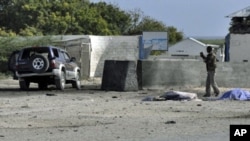International backers of Somalia's Transitional Federal Government are calling on government leaders to show cohesion and unity, signaling a growing unease in the international community about the stability of the fragile administration.
In a press statement, top foreign envoys to Somalia – including the U.N.'s Special Representative Augustine Mahiga, his counterpart from the African Union Boubacar Diarra, and Kipruto arap Kirwa from the regional body IGAD – described the ongoing feud between Somali President Sharif Sheik Ahmed and the Prime Minister Omar Abdirashid Ali Sharmarke as "unhelpful" and "potentially damaging" to a country ravaged by nearly two decades of war.
The envoys said those who stand to gain most from the in-fighting are extremists, led by al-Qaida-linked al-Shabab group. The envoys stressed that President Sharif and Prime Minister Sharmarke need to work together to tackle the enormous challenges of defeating the Islamists' threat and establishing security by next August, when the mandate of the transitional government is set to expire.
Last Thursday, the three diplomats traveled to the Somali capital, Mogadishu to try to mediate between the Somali leaders. The diplomats were holding talks with President Sharif inside the airport when it came under attack by gunmen and suicide bombers sent by al-Shabab.
The envoys were not harmed. But observers say the attack drove home concerns that the U.N.-backed government is failing to address mounting security issues.
The current Somali government came to power in early 2009 and is the 15th attempt by the international community to form a central government in Somalia since 1991. It is made up of former Islamist opposition leaders and secular politicians, who were expected to reconcile with hard-line Islamist opponents and establish a functioning administration in Somalia.
But the anti-government insurgency intensified, leaving the government in control of only a small area of Mogadishu defended by African Union peacekeeping troops. Meanwhile, rising insecurity prompted hundreds of parliament members to flee Somalia and seek safety in neighboring countries and internal divisions paralyzed the government.
In May of this year, the Somali president tried to oust the prime minister by firing him, but Mr. Sharif failed to win parliamentary support. London-based Somali political analyst Liban Ahmad says that incident clearly demonstrated the degree of animosity that exists between the two leaders.
"The power struggle that started back earlier this year, when the president sacked the prime minister only to reinstate him in the same week, that power struggle is still going on," Ahmad said. "So, as long as the core issues of power between the two men are not addressed, it keeps coming [back] to really disappoint the partners of the TFG [Transitional Federal Government]."
Repeated political battles have led to President Sharif dissolving the cabinet. Many lawmakers and Cabinet members are said to be divided into pro-Sharif or pro-Sharmarke factions.
And there is little sign that the disputes are coming to an end. On Monday, Prime Minister Sharmarke openly accused the president and some allied ministers and lawmakers of plotting to undermine his authority and oust him from government.










